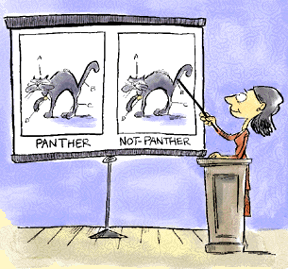Purrfectly Obvious

This is the story of a runaway cat that helped me make a point
in a customer service seminar I was presenting to a client
company. We were talking about how easy it is to make false
assumptions and how they can lead you astray when youíre
supporting customers.
The problem with assumptions, of course, is
that you may not be aware youíre making them. And itís so easy to
be unaware when the situation is clear-cut and familiar.
In this instance, we were part way through the seminar when an
administrative assistant appeared with a message for Tara, a
manager in the group. The message was from Taraís neighbor who
had called to say that Taraís cat, Panther, had gotten out of the
apartment and was running around in the hallway of her
building.
"Not again!" Tara exclaimed. She said the cat
probably dashed out when her cleaning lady opened the door. I
told her this was the first time Iíd ever had a class
interruption caused by a fleeing feline.
Fortunately, Tara lived only a few blocks away from work. Her
admin was most accommodating and, as sheíd done in previous
runaway-cat episodes, offered to go to the apartment, retrieve
the cat, and return it safely to Taraís apartment.
Which she did and didnít. That is, she did go over to the
apartment. But she didnít retrieve the cat and return it. Why? It
seems it wasnít Taraís cat. Sheíd met Taraís cat before, and knew
this wasnít it.
Tara had made an assumption. She had assumed it was her cat.
It sounded like her cat. It was the sort of thing her cat had
done before. There was no reason for Tara to question the
situation before leaping to conclusions. As a result, the idea of
calling her neighbor back and asking a few questions to validate
that it was her cat never occurred to her. So she didnít ask what
the cat looked like. She didnít ask where, exactly, it was found.
And she didnít bother to ask if it responded to
"Panther." The odds were that it was her cat. Except
that it wasnít.
The fact that Tara lived nearby eliminated the need to analyze
the situation more carefully. It was easy enough to just check it
out. If it had been her cat, the problem would
have been quickly resolved. And even though it wasnít her cat, no
one had been seriously inconvenienced.
But what if Tara had lived further away? Or her admin hadnít
been available? Or as accommodating? Or what if the temperature
had been below freezing or raining you know what and dogs? Would
any of these conditions have caused Tara to challenge her
assumptions, or ask some questions, or avoid allowing strong
circumstantial evidence to lead her to a false conclusion? Who
knows?
I was most appreciative of Tara. Itís wonderful when real life
intervenes in a non-threatening way to help drive home a point.
This exquisitely-timed situation helped to reinforce for class
participants how easy it is to make false assumptions. And false
assumptions are every bit as easy to make when youíre assisting
customers. Questioning their every word and statement
would be a bit extreme. But from time to time, mull over
every word and statement, and see if it helps you identify some
of the assumptions you or your customers might be making.
By the way, Tara isnít the managerís real name. And Panther
isnít the name of her cat. Iíve changed both to protect Tara from
the taunts and jeers of those know-it-alls who, in the same
situation, would have automatically asked, "How do you know
itís my cat?" If I ever catch you in a
situation that helps me make a point, Iíll do the same for
you.

